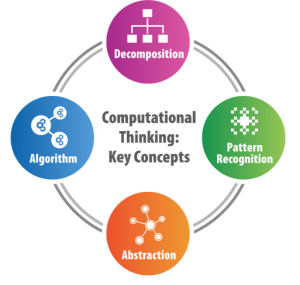All the humans are dead
A recent article has suggested, “computational thinking” is critical thinking and therefore could be applied to any subject. But is it? In order to determine if indeed it is one needs a definition. My research led me to a term ascribed to Seymour Papert, the inventor of Logo. Finally, I found this definition, provided by The Center for Computational Thinking at Carnegie Mellon University.
Computational Thinking is the thought processes involved in formulating problems and their solutions so that the solutions are represented in a form that can be effectively carried out by an information-processing agentSo computational thinking is a way of solving problems using algorithms that can be carried out.

- Decomposition - the breaking down of a complex problem into smaller more manageable parts.
- Pattern recognition - looking for similarities among and within problems.
- Abstraction - focusing on the important data only and ignoring that which is irrelevant.
- Algorithms - developing a series of steps to solve the problem, or rules to follow to solve the problem.
As a science teacher, the above steps look a lot like mathematics and science to me. Furthermore, the definition makes the distinction unclear between “computational thinking” and other ways of thinking, or as the article suggested critical thinking. However, according to most educational technology articles I read on computational thinking like the one that began this post, the argument seems to be that in order to flourish in today’s world, computational thinking has to be a fundamental part of the way our learners think and understand the world. However, the more I read on what computational thinking is, the more it seems we are risking taking “computational thinking” more seriously than it actually deserves.
The reservation I have with the drive for "computational thinking" in classrooms is that the argument seems to be based around employment. That employers are using digital technology to redefine work, and if you wish to remain compatible with this new world, then you had better start thinking in new ways or remain redundant to society. That for me is too narrow a justification. Education is so much more than gaining employment and we should be developing learners who are creating their own futures not having them dictated.
The problem to me seems to be that we are looking at computational thinking backward. Society is enamored by digital technology and so, therefore, is education. Computational thinking ascribes to computer science all of the positive attributes of the scientific method and mathematical proofs but completely ignore the negatives and tells us that we should all tackle problems like a computer would. Never mind that computers frequently yield the least simple, safe, quick, and durable solutions to the many problems we face. We forget that computers have adapted slowly to humanity. It is this nature of computational thinking that we ignore and then forget.
Speaking of forgetting, I remember the buzzword when I was at school was “computer literacy.” Just like computational thinking the term is concerned with the changes brought by computers, and we needed to become "literate" in using computers in order to gain employment. But just as computational thinking is not a new way of thinking, computer literacy was not a new form of literacy. Literacy is knowing how to read and to write and allows access to knowledge. Computer literacy, on the other hand, is not permanent or expansive as literacy and is more a mixture of technical proficiency on a certain application, ritualistic responses to computers (turning it off and on again); and chronically low expectations how to use computers (excel spreadsheet anyone?). In other words, computer literacy prepared people to cope with working with computers. Computational thinking is just the next step in this process.

Even if modern life is more overwhelming or economically precarious than earlier times, and even if computers are part of this change, computational thinking does not rate alongside critical thinking. It’s not novel as little distinguishes computational thinking from the processes of mathematics and science. Computational thinking may have a place in the classroom in some contexts, but it has clear limitations and should not be front and center. Subjects such as psychology, philosophy, and history are more important for learners to develop an understanding of how they fit within society and how they can enact change and are therefore what we need to focus on. They need to be taught with depth and passion, to show students how history shaped the present, to show them that countless futures are within reach, and to prepare them for a productive and equitable future based on our shared creative humanity. Otherwise, the following could become a reality!



Comments